Joy Neal Kidney's Blog, page 77
December 30, 2020
The Blessings of 2020
of Covid, the derecho storm,
and a contentious election,
I thank God for many blessings
during 2020.
I have a new shoulder, and a young
physical therapist now knows the difference
between being a senior citizen and being elderly.
Our American Stories aired
a half dozen stories, recorded in
my grandmotherly voice.
Paul Berge narrated Leora's Letters,
and wrote such a compelling story about
the experience that reached hundreds.
Guy chain sawed for the neighborhood
after the derecho, collected their leaves,
and rescued a 1945 King Cleveland trumpet.
The manuscript for Leora's Depression Era
stories is in final stages, and two more books
got mapped out during this memorable year.
December 28, 2020
Clabe and Leora Wilson, the end of 1945
The war had been over officially since early September, 1945, but the Wilsons were still in limbo with one son buried and two sons still listed as Missing in Action. Danny had been missing since February, in Austria. The war in Europe had ended in May. Still no word by Christmas.
And Dale. He and his crew were shot down in November two years earlier. Nothing. At least they were able to write the families of the other crew members, but they were all left with a strange anxiety.
When Junior was killed in August Delbert was discharged from the Navy. He and his family moved to Iowa to be with his parents.
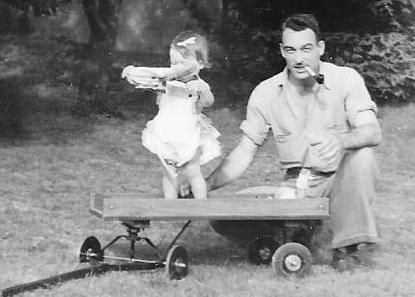 Leora Darlene with her father and the wagon he built for her.
Leora Darlene with her father and the wagon he built for her.With precious sons still missing how can life begin to settle into a routine? But Clabe was having tooth problems and had been to the dentist. Leora regularly churned butter now that they had cows.
Finally they got a phone installed. It rang one night after 9:00. Donald and Rose had just arrived in Perry in their Studebaker. Donald was still in the Navy, thinking that he would make a career of it, having served since 1934.
 Donald and Rose Wilson with their Studebaker, back to Iowa from Washington State.
Donald and Rose Wilson with their Studebaker, back to Iowa from Washington State. Warren Neal holding Joy, Donald Wilson, Clabe Wilson, Delbert Wilson holding Leora Darlene, October 1945, Perry, Iowa.
Warren Neal holding Joy, Donald Wilson, Clabe Wilson, Delbert Wilson holding Leora Darlene, October 1945, Perry, Iowa.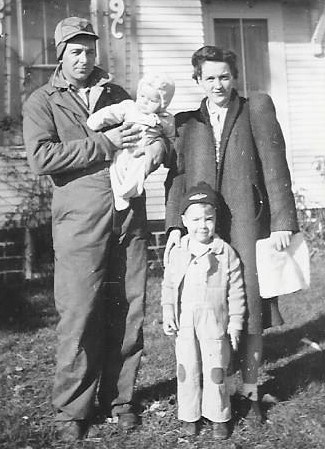 Sam and Darlene Scar with Richard and baby Robert.
Sam and Darlene Scar with Richard and baby Robert.Clabe had a tooth pulled, and they picked up fish from the depot that Donald and Rose had sent when they got back to Washington.
Donna Gaye was born to Delbert and Evelyn in Perry, November 21 at 12:55 p.m. Ten days later, Evelyn and baby went home from the hospital. Leora churned four pounds of butter, and sold butter, eggs, and twenty hens in Perry.
December 4 was Leora’s 55th birthday. She got her annual “kerchief” from her mother, a plant, nightgowns, and a box of Drews chocolates.
Clabe helped Delbert begin to wire the house for electricity. And Clabe was still having toothaches, and his wife also. Clabe had a tooth pulled the next day. Leora’s jaw was swollen by Thursday, but she waited another week to have two teeth pulled. The same day they got a Guernsey bull, and Leora churned more butter.
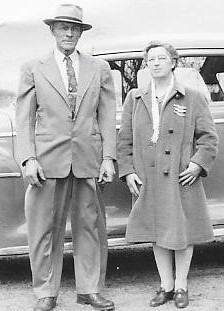 Clabe & Leora Wilson, Perry, Iowa.
Clabe & Leora Wilson, Perry, Iowa.Sleet and snow fell all day Christmas Eve. Sam and Darlene, with Richard and seven-month-old Robert were to come the next day but couldn’t. So Clabe and Leora, Delbert’s family, and Doris’s family had a Christmas dinner of bacon and eggs.
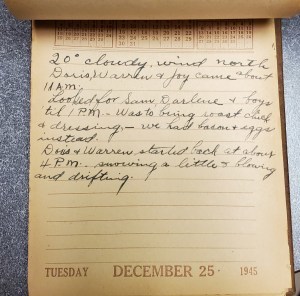
What a comfort to have their oldest son and his family living with them, a blessing to end such a terrible year. Even in the middle of the heartache.
December 25, 2020
Childhood Manger Scene

Isaiah 9:6 For to us a child is born, to us a son is given; and the government shall be upon his shoulder, and his name shall be called Wonderful Counselor, Mighty God, Everlasting Father, Prince of Peace.
This is the manger scene from my childhood. As I got it out this year I noticed that Mom noted that her mother (Leora Wilson) had given it to her, probably in the early 1950s.
The background stable is new and the angel isn’t part of the original figures. A shy donkey is at the left.
I didn’t know when I was young that the magi weren’t part of the newborn scene, although the shepherds were. But I enjoy that they are part of a childhood heirloom that I’ll pass down to my own granddaughter.
—–
Read more: https://www.whatchristianswanttoknow.com/17-bible-verses-about-the-birth-of-jesus/#ixzz6dyJs2u7Y
December 23, 2020
Christmas: Saudi Arabia by Rich Muniz
by William R. Ablan, pen name of Richard L. Muniz
People talk about Christmases they’ll never forget. Well, the one I won’t forget is a Christmas stripped of Christmas trees, fancy meals, a glass of wine by the fireplace, or presents.
We (meaning the boys of 6th Platoon, 501st MPs, 1st Armored Division) were in a large tent, huddling around a gasoline-powered stove, trying to stay warm. We were someplace in Saudi Arabia, a stone’s throw from a small town called Al Qaisumah. None of us wanted to be there. But we were courtesy of a gentleman named Saddam Hussein, who thought it would be a great idea to go south and invade his neighbor. We all knew we had to chase him out of Kuwait, but right then, right there, we were shivering in the cold and feeling sorry for ourselves.
You haven’t seen cold till you’ve seen it in the desert. I’m a native of Colorado, and I’ve been in the great Rockies in the middle of snowstorms. As a boy, I shivered in the cold, chopping a hole in the ice of the river so the cows could drink. As a soldier, I’d been on the great plains of Kansas as savage blizzards beat down, or crossed the Bavarian mountains with a foot of snow and bitter cold frosting the trees.
But the desert is a whole different kind of cold. It’s miserable, a pierce you through and freeze your soul kind of cold. Our tiny stove was doing nothing to keep us warm even though we were wearing field jackets and gloves. Most everyone wore a stocking cap. I was reminded of one of the episodes of M*A*S*H. Only we weren’t jolly about it.
We’d shipped out and down to where we were a mere ten days earlier. It already felt like an eternity. The married men were wondering what their families were doing. Some spoke of traditions like attending Midnight Mass or opening presents on Christmas Eve. I lay back on my cot and wondered if my children had received the presents I’d sent from Germany before I shipped out. They’d probably arrived broken if they had at all, denying them the pleasure of breaking them themselves.
And I remembered the Christmas before. I took the train in Nuremberg and walked through the Kringle Market, smelling the spices hanging like a fog over the booths and old town. I purchased a glass of warm Gluhwein and walked around. It had started to snow, the flakes falling into the drink like tiny meteors streaking to their death. I walked past one of the old churches and paused, listening to a choir singing “Silent Night” in German.
I thought I’d never been more alone on the planet than that Christmas. I was wrong. It’s worse when you’re sharing the day with twenty-four other guys who would rather be anywhere else.
To lighten the mood, several of the guys got some empty MRE (Meals Ready to Eat, or Meals Rejected by Ethiopia – take your pick) boxes and cut them up. They began forming a Christmas tree out of it. The colored it up using some Magic Markers, then using small bits of trash, they fashioned ornaments for it. They failed miserably to raise any spirits. A sandstorm came up, damping the spirit the “made in Saudi Arabia” tree had tried to kindle.
My Christmas dinner that day was MRE Number Eleven, Chicken and Rice. I gave myself a treat and put it on the stove to warm it up. While I ate, someone found the Armed Forces Radio station, and Bing Crosby tried to cheer us up. It wasn’t working. So we switched to Baghdad Betty, who at least brought a smile to our faces, urging us all to go home because our wives and sweethearts were all messing around with Tom Cruise, Kevin Costner, and Bart Simpson.
Someplace in all this, our LT and Platoon Daddy disappeared. I think we were too miserable to care. They came back just shortly before sunset, told us to get our gear, and that we were all going down to the checkpoint.
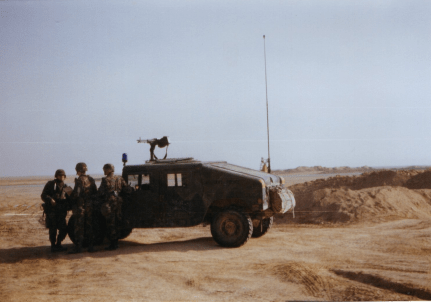 Checkpoint Bravo
Checkpoint BravoCheckpoint Bravo was nothing more than a hole in the ground scooped out for us by the division engineers. The idea was we could park the Humvees in it. The purpose of the checkpoint was to direct military convoys off the highway and towards where they needed to go. Right now, there were no convoys, and we had no clue why we were going down there.
Once there the LT told us all to gather around. SSG Tim Honor was a PK (Preacher’s Kid), and that made him the closest thing we had to a Chaplin. He took out an old Bible, opened it, and told us to take off our helmets. He read Luke, Chapter 2, to us. I don’t think there was ever a congregation more moved by those words. He spoke of how a man and woman who was about to give birth went to Bethlehem. Of how the woman gave birth in a stable, and the child was placed in a feed trough since he had no crib. And of how Shepherds came and worshipped the child because He was God in the flesh. And then he finished with John 3:16, telling us that the reason for this birth was because the only one who could save us from our sins was God himself. And so he gave his Son to make sure that happened.
Then we sang “Silent Night.” I’ve had the pleasure of hearing some of the greatest singers and choirs in the world. None of them were ever as earnest as us. Very few of us could sing well, but as our voices rose of the desert in a distant land, something amazing happened. With the surge of our voices, our depression lifted like fog before the morning sun. At that moment, the true meaning of Christmas dawned on us.
It wasn’t about the meal, or the tree, or the presents. It was about being with the ones around you and sharing in the joy the small child had forged. Christmas was about being united by that little child and saved by the man He became. It was about being forged into a group of men who realized we were family.
Tim then said there was something he wanted us to share and brought out a canteen cup filled with torn up pieces of MRE bread. He also had a box of juice with a straw in it. “I’d like us all to share communion,” he said. We were all different faiths. Some were Christians, some Catholics, we had a Mormon or two, and more than a few agnostics, but we put that all aside. For the believers, we remembered that the bread represented Christ’s body, and the juice his blood. For the others, it was a symbol of the small community we were.
We each got a piece of bread and a sip of juice. It was a communion that caught what Communion was all about.
After Tim dismissed the service, we found that our LT and Platoon Daddy had gone on a secret mission into the nearby town. They’d purchased a case of Pepsi and a couple of boxes of snack cakes. So under an ice-cold sky decorated with a galaxy of stars, we hugged, wept, and enjoyed the family we had with us.
To my Brothers and Sisters, I’ve served with, and to those who currently hold the line, on the land, on the sea, or in the air. To the police, firefighters, and EMTs. May you have a Christmas that is as meaningful as that one was to me. God keep you safe and come home to us soon.
Merry Christmas all.
Published in the Sunday December 20, 2020, issue of the Greeley Tribune.

Reprinted with permission.
Rich/William has a compelling website, and has recorded episodes for Our American Stories:
The Atomic Marine (8 minutes)
An Army Moves on Its Stomach. . . and Lots of Coffee (8 minutes)
The Wreck (12 minutes)
December 22, 2020
Christmases 1927 and 1928
Christmas 1927
Every Christmas eve each Wilson child fastened a stocking on his own chair at the table, hoping for a treasure from Santa. That Christmas Doris had found a two-headed doll with one body in her stocking. The heads screwed on–a baby one (Mary Etta, with a hood) and a girl one (Donna Zetta, which had a bonnet). Darlene’s stocking also held a doll, one with a “momma thing” in it.
 Doris’s doll had just two heads, but I suspect it may have been one of these Berwick Famlee dolls from the 1920s.
Doris’s doll had just two heads, but I suspect it may have been one of these Berwick Famlee dolls from the 1920s.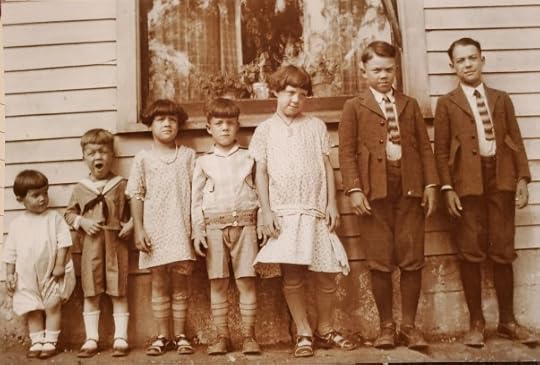 Wilson kids, south of Dexter, 1927: Junior, Danny, Darlene, Dale, Doris, Donald, Delbert
Wilson kids, south of Dexter, 1927: Junior, Danny, Darlene, Dale, Doris, Donald, DelbertChristmas 1928
Calvin Coolidge, who had not run for reelection and was still President, said in his State of the Union address, “The country can regard the present with satisfaction and anticipate the future with optimism.”
The Wilsons were skeptical of his political hyperbole, as their family began “scraping the bottom of the barrel.” When the cow gave no more milk, Clabe sold it for $75.
He and Leora made out an order to Sears Roebuck & Co. They ordered food in bulk–oatmeal, 3 gallons of sorghum, graham and white crackers, prunes, large jars of peanut butter, clothes, boots, winter coats for the kids. Clabe mixed Karo molasses with peanut butter to spread on bread. Sorghum was considered a tonic.
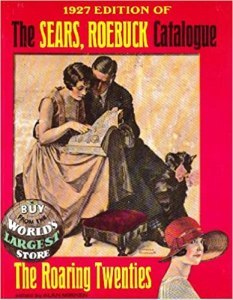
Leora asked Doris if she’d like to choose fabric From for a new nightgown. Before Christmas Doris noticed a box with a broken corner under her folks’ bed had a shiny zeppelin peeking through. The zeppelin, a wind-up pull toy, showed up in Junior’s Christmas stocking.
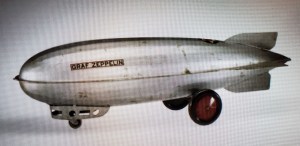
“Santa” also left two small boxes on each chair around the table–one with nuts, the other with candy. She was suspicious about Santa anyway, then Santa brought Doris a nightgown made of the fabric she’d picked out in the catalog.
December 21, 2020
It’s Nice to Be Mice at Christmastime
 1976, from Grandpa and Grandma
1976, from Grandpa and GrandmaOur son was two years old, so his grandparents gave Dan this storybook for Christmas. I began to remember some favorite stories from when I was little–“The Snowshoe Rabbits,” “The Goat Who Played Santa Claus,” “The Secret Ride.”
One story took me back to First Grade.
We sat on the floor around the teacher while she read a story to us. Afterwards we were invited to stand in front of the class and share or recite something. I raised my hand. The teacher called on me.
I couldn’t get up. My legs had gone to sleep.
When I finally could stand, I recited “Oh, the wonderful bits that folks drop as they go. . . .” which ends with the punch line “Oh, just before Christmas it’s NICE to be mice!”
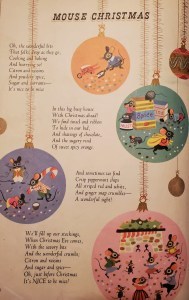
Mom and given Gloria and me the book in the 1950s. That childhood copy has been loved hard. The cover is long gone, and it’s held together with electrical tape.
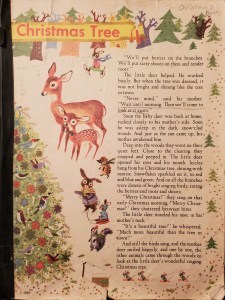
The last story in the book is “The Christmas Tree Lamb,” although it’s missing from the copy from my childhood.
When Dan was little I made a felt lamb for our tree, complete with bell, because of this darling story.
We always hung it “up near the top, right under the shining star,” just like in the book, except that our star is made a felt, just like the lamb.

Time to pass these treasures onto granddaughter Kate.
The only thing better than an heirloom is an heirloom with a story.
December 19, 2020
The Rescue Trumpet
Once upon a time there was a Guy who liked old stuff, especially old stuff you could fix up. Or recycle.
So, he was hunting in the dumpster in the church parking lot for cardboard or anything worth passing on to someone else. He pulled out a black suitcase, certainly not expecting a musical instrument.
He opened the case and, lo and behold, it held a trumpet. He rescued it and eagerly brought it home. This trumpet and flugelhorn player is missing playing Christmas concerts this year at retirement homes with the Des Moines members of New Horizons Band.

He began carefully taking it apart, which turned into an ordeal, as some of the slides were hard to work apart, even after saturating the entire horn with oil. He worked with the valves until they worked smoothly.
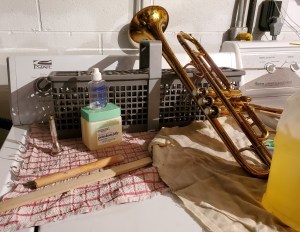
Researching the stamp on it, it’s a 1945 King Cleveland 600. But the tuning slide absolutely wouldn’t let loose, even after taking a torch to it, so he stopped by Rieman Music, which is where New Horizons Band practices. Mark, who works there there, got caught up in the story of the rescue trumpet. He managed to get the dent out that was causing the problem and did some resoldering. He also replaced the third valve slide and ring, the felt pads under the finger buttons, and a cute little knob.
 1945 King Cleveland 600 in its recently glued nest.
1945 King Cleveland 600 in its recently glued nest.Guy brought home the trumpet to its red nest, which he’d reglued into the case, and he shined up his adoptee with Brasso. This just might turn out to be his favorite horn.
The only thing better than having an old trumpet is having an old trumpet with a story.
December 18, 2020
“Leora’s Letters” by Paul Berge, Narrator of the Audiobook
By Paul Berge
Published on AVweb: World’s Premier Independent Aviation News Resource December 17, 2020. Reprinted with permission.

TC can be unmercifully dull when no one’s flying. It’s a little like non-combat guard duty in the Army; I pulled a lot of that. The public conjures images of steely eyed sentries at Fort Dix, squinting into the New Jersey mist, M-16s at the ready. Or at least that’s the image I had when reporting for duty there at age 18. In reality, guard duty will suck the esprit from anyone’s corps.
During my inglorious military career, I spent many mind-numbing hours guarding empty buildings from invasion by no one. Similarly, my ATC fantasy poses me as a square-jawed controller intently gazing at a radar sweep, tracking minimally separated airliners. Except, when there’s no air traffic it searches in vain, and while that gets boring, it affords quality time for controllers to catch up on tower gossip.
Thirty-some years ago I was an FAA controller in the Des Moines tower, working an uneventful swing shift with a guy named … Guy, Guy Kidney. His wife’s name is Joy. That’s germane, because on that snowy evening with everything grounded, Guy told me how Joy—this is starting to sound like a shift-before-Christmas story, but it’s not. Instead, Joy was researching her family’s Word War II history, especially accounts of her five uncles. Two had been sailors and three served in the Air Force (Air Corps, then Army Air Force). The brothers scattered to Europe, Africa, the Caribbean, Australia and New Guinea, plus training assignments across the U.S. Joy’s goal was to write a book about their experiences, largely gleaned from boxes of wartime letters to and from her grandmother, Leora Wilson.
Joy’s uncles—Del, Don, Dale, Dan and Claiborne, known as Junior—grew up on a small Iowa farm without indoor plumbing or running water, unless you ran from the well to the kitchen with the pail. Heat was supplied by the wood you cut, split, and stacked, plus the sweat you worked up doing so. By Depression era standards, they weren’t poor; it’s just how rural life was—hard, but they ate well, did their chores, graduated high school and went off to war like millions of other young men and women. All five volunteered. The two older brothers, Del and Don, joined the Navy before the war. Del repeatedly crossed the North Atlantic on oil tankers, which were juicy targets for U-boats. Don was onboard the carrier Yorktown when it was sunk in the Battle of Midway in 1942. Sobering images both. The three younger brothers joined the Air Force as age allowed.
After leaving ATC in 1997, I lost track of Guy and had never met Joy. I forgot her research project, until early in 2020 when she contacted me, saying that her book, Leora’s Letters, was published and asked if I would voice the audiobook version. She knew I did studio voice work and sent me the paperback. Gotta admit, I hesitate to accept unsolicited works. Often, they’re poorly written, but Leora’s Letters had me sitting up in awe of these five brothers, serving in situations most of us can’t fathom.
Anyone with a History Channel exposure to World War II knows how skinny the odds were that all five uncles would survive the war unscathed. I won’t disclose their fates, but their stories make it clear how dangerous flying military hardware—that we civilians admire at airshows—can be, especially in combat. Flying warbirds in peacetime air shows also holds risk far beyond my skill level.
Dale Wilson flew B-25s, Dan P-38s, and Junior P-40s. They trained in Stearman biplanes and the monoplane Vultee Valiant (aka Vibrator) before receiving advanced single-engine training in the North American AT-6, or the twin-engine AT-17 Cessna Bobcat. But that merely lists what they flew. Their letters home to their mother, Leora, tell each young man’s personal story in their own unvarnished, hand-written words.
Who writes letters anymore? We text, tweet, and make snarky comments on Facebook, knowing we’re protected from return fire by cyber fugazis, that are cheap substitutes for courage and duty. In World War II, these brothers wrote home from desert training bases and jungle combat zones, as they struggled to transition from farm boys to pilots ordered to fly to any spot on the planet and do battle with other young men, who probably wrote to their mothers.
I wrote this piece on Dec. 7, 2020, 79 years after the Japanese attack on Pearl Harbor that sent five Wilson brothers off to war. Because there was no internet, they wrote home, and because moms save letters from sons in danger—plus dreaded War Department telegrams—“The secretary of war desires me to express his regret that your son…”—Joy Kidney was able to piece together five moving stories. Can tweets and texts be preserved with the same impact or solemnity? I doubt it.
I learned to fly while stationed in Hawaii and flew my first solo at Wheeler AFB (now AAF) on Dec. 7, 1974, 33 years after the Japanese attacked Oahu. I felt my three landings did more damage to the runway than the Japanese had. Once solo’d, I’d routinely fly to Ford Island at Pearl Harbor for touch-and-go’s. Laps around the pattern took me over the Arizona Memorial, but initially I was too busy being a frazzled student to look down at it with any appreciation.
Then, as I gained confidence and realized I could simultaneously breathe and fly, I looked and saw the ghostly shape of the sunken battleship, tomb to the 1102 sailors and Marines killed that December morning. Whatever hardships I claimed in my young life paled in comparison to those entombed below me and to the sacrifices Leora Wilson’s family made to this country … hell, to the world.
As I recorded the audiobook and reached passages of inevitable grief delivered in War Department telegrams, my voice tensed up, and it took several takes to get through. Leaving the recording booth, I faced the engineer, Steve Mathews—whose father had been a B-25 pilot—and I knew he was choked up, too. It’s powerful stuff.
Leora’s Letters, by Joy Neal Kidney, is meticulously researched, humbling in delivery, and never dull. Precious is the storyteller who can pull that off. You can find both the print and audio version on Amazon.
—–
Paul Berge, masthead writer for AVweb, is the author of several books, including my favorite Aeromancy. He’s also a veteran, pilot, writer, has had his own radio program called “Rejection Slip Theater,” hosted an Iowa travel series on IPT, and so poignantly narrated Leora’s Letters for Audible earlier this year.
December 16, 2020
Aimless Life, Awesome God by Robert Frohlich
The Book

“Why am I still alive?” That question was in the back of his mind when in 1965, Robert Frohlich was headed out towards Arizona to look for a job after serving in the army for three years. Escaping a splintered family and a troubled past, his car broke down in Wisconsin. Through a series of events that involved finding life-long friends, stable work, and the love of his life, he never left, finally finding a place to stay after wandering for most of his life.
However, that was not the first time God caused Robert’s life to change direction, nor will it be the last. By learning to trust in the Lord and let things come as they may, Robert has led a fulfilling life serving God, his family, and his community. Aimless Life, Awesome God is the story of Robert Frohlich, but it is also the story of anyone willing to let God redirect their lives according to His awesome plan.
The Author
Robert’s journey from manager to speaker to author is marked by hi s eagerness to tell a story. And it’s always been a true story. One of his readers, after finishing Frohlich’s book Aimless Life, Awesome God exclaimed, “Wow! You’ve had a lot of different experiences!” Always looking for the next thing, Robert moved from his birthplace in New York to settle, quite unexpectedly, in Wisconsin.
s eagerness to tell a story. And it’s always been a true story. One of his readers, after finishing Frohlich’s book Aimless Life, Awesome God exclaimed, “Wow! You’ve had a lot of different experiences!” Always looking for the next thing, Robert moved from his birthplace in New York to settle, quite unexpectedly, in Wisconsin.
Often changing careers, he moved from sales to training to managing, with many odd jobs in between. And as his career moved along its erratic path, his faith grew ever more strong. It was inevitable and it was necessary. Death came close a couple of times, and temptations were everywhere. Yet Robert’s growing faith and trust in God carried him through the darkest times and led him through all the twists and turns of life.
It was this faith that led Robert to become a preaching layman, serving in leadership positions in three different churches. Because the best, true story Robert could tell was the Gospel story; salvation by grace alone, through faith alone in Christ alone.
Robert Frohlich still lives in Wisconsin, with his wife of more than 50 years, Marleen. Together they have two daughters and three grandchildren. Robert’s next book will be about….well, we’ll just have to wait and see.
My Thoughts
What an amazing life, an amazing story of God’s hand on one life, in spite of a broken childhood and even poor choices. I love stories that show God’s surprising nudges in a life through the decades, and the influence of that life on those around him.
I enjoy following this author’s website. His grandfather and mine both drove early 1940s Plymouths.
He has told stories which have been aired on Our American Stories, amusing episodes dealing with trucks a lot larger than he was used to:
Learning to Drive: Most of us know how to drive, but very few of us have had to re-learn to drive unexpectedly. . . on the top of a mountain; however Robert Frohlich has. (19 minutes)
3, 2, 1, You’re It! Robert Frohlich tells the story of his bad road trip while volunteering to bring trucks to impoverished communities in Appalacia. (11 minutes)
December 14, 2020
Missing Antique Knives, and How Junior Gets Blamed For It
Excerpt from Leora’s Dexter Stories: The Scarcity Years of the Great Depression:
Dale and Darlene turned twelve in May, which meant that Dale was old enough to carry a gun while hunting. And Darlene had started babysitting for Zedonna Neal, daughter-in-law of O.S. and Nellie and a home ec teacher, who lived in the neighborhood. Rawson was four years old and Jimmie wasn’t quite one.
Once in a while Leora was puzzled at how an everyday table knife got broken. “Junior keeps sticking them between the table leaves,” Darlene told, “and flips them back and forth. I told him to stop, but he doesn’t listen.”
“You’re not the boss of me!” Junior piped up.
Narrative/Creative Nonfiction
Narrative or creative nonfiction uses fiction techniques, such as imagined dialogue, to convey history in a more lively way. Leora’s World War II story uses narrative nonfiction, and her Depression Era story will as well.
The above spat came about because of two stories I knew about the family–Darlene’s babysitting job and bossing her younger brothers, probably just like she bossed the Neal boys.
I ended up with an old set of silverplate that belonged to Grandma Leora Wilson. The only thing better than an heirloom is one with a story. I knew that Clabe had given Leora the tableware for their 1914 wedding, so was delighted to polish each piece and use it for a family gathering.
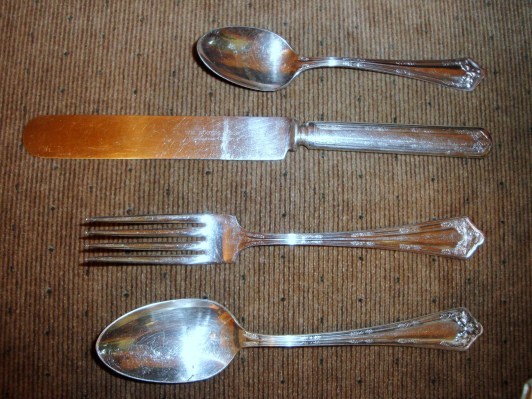 1913 Fair Oak pattern by Wm Rogers & Son
1913 Fair Oak pattern by Wm Rogers & SonBut we were short a knife or two. I remarked about it to Mom.
“Well, while waiting for supper to arrive at the table, one of my younger brothers would absently stick a knife between table leaves and bat it back and forth. I know that at least one was broken that way.”
Working through the stories of the manuscript, I’d learned the personalities of Dale, Danny, and Junior.
Sorry, Junior. This episode was easily pinned on you!

The only thing better than an heirloom is an heirloom with a story. – Joy Neal Kidney



